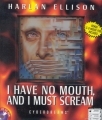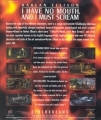I Have No Mouth, and I Must Scream
First posted on 28 August 2010. Last updated on 28 August 2010.
About the author
Jenny Rouse is a computer geek with a Master's Degree in Industrial/Organizational Psychology. When she is not playing pop psychologist or fixing computers, she relaxes by playing the adventure and role-playing games of her youth. Due to an affinity for the written word combined with a complete disdain of the cubicle workforce, she also holds aspirations of being a professional writer. She currently lives in the United States.
In 1967, famed sci-fi writer Harlan Ellison penned a story about 5 people being eternally tortured by a sentient supercomputer, known as AM ("I think, therefore I am."), in a post apocalyptic world. Titled "I Have No Mouth, and I Must Scream", this allegory of hell, set after World War III, left much to the reader's imagination and could not be called a cheery piece of fiction by any stretch of the imagination. Therefore, it came as a surprise when, in 1995, developer The Dreamers Guild and publisher Cyberdreams decided to flesh out Ellison's short story and turn it into a computer game of the same name.
As a result of Ellison's subsequent collaboration with the game's designers, the expanded narrative in the game fits seamlessly with his original storyline. Each character has now been given a back story, gleaned throughout their respective stage within the game. The player takes on the role of each of AM's prisoners: Benny, the simian war veteran; Ellen, the troubled corporate engineer; Gorrister, the guilt ridden truck driver; Nimdok, the inhumane Nazi scientist; and Ted, the paranoid, narcissistic faux socialite. After 109 years of torture, AM gives the characters a new quest through their own personal hell by playing out each character's respective psychodrama, unwittingly giving them a chance to redeem themselves morally. Serving as a backdrop is a plot involving 2 other supercomputers working within AM's circuitry to help the player to overthrow the artificial intelligence's malicious rule.
The game is built using The Dreamers Guild's proprietary SAGA game engine. Comparatively, it is inferior to LucasArts' SCUMM engine, though the gameplay generally does not suffer from this choice. The flexible engine allows the player to fully interact with AM's various macabre realities inside the game. The graphics are in SVGA and of high quality, providing a sharp contrast between the characters and the backgrounds, the latter of which vary in style depending on location. There are also several cinematic sequences that add nicely to the macabre atmosphere. While the game certainly looks good, the graphics are not completely devoid of glitches, with sprites often overlapping each other (most notably when a character bends to pick something up). The animation is also sometimes choppy. The game's MIDI music is not terrible, as it contributes nicely to the overall atmosphere, but it is not particularly memorable, either—a surprise, considering that the music is composed by John Ottman, better known for scoring films like The Usual Suspects and X-Men. Incidentally, AM is voiced by Ellison himself.
During gameplay, each character's status is shown by a spiritual barometer (indicated only by the color behind each character's portrait) that measures each character’s level of moral redemption, or lack thereof. It is possible to beat any given stage of the game without having fully morally redeemed each character, though the lack of full redemption seems to factor into how the final stage plays out. At any time, the player can access the psychological profile of each character, which also acts as an in-game hint system. Some of the puzzles, especially those in the latter part of the game, are surprisingly difficult. It is important to note that the usage of the book lowers a character's spiritual barometer, so it is best not to rely upon it indiscriminately. The game's finale is particularly noteworthy. While keeping the same interface utilized throughout the entire game, the player is thrust into a world of psychology, forcing the characters to interact in the Freudian paradigm of AM's cerebrum. Due to the sharp change in atmosphere, the endgame can sometimes feel disjointed from the rest, though the experience does not detract enough from the game to render it unplayable.
Despite being a DOS based, point-and-click adventure game, it is beneath this formatting where the true inspiration—and fun—lies. Simply put, the game deals with mature moral and ethical dilemmas, and the solutions to these problems are never as clean-cut as some gamers may find comfortable in dealing with. Oftentimes, the most logical choice is the incorrect choice, and the player will ultimately be unaware of the consequences until the climax of the game. Ellison once stated that it was his desire for the game to be impossible to win. This desire is fully realized in the game: technically speaking, the player cannot beat this game. (Even the manual states, "There is no winning in the conventional sense. There are only ways to lose heroically, gloriously and at the peak of one's humanity. Or to lose ignominiously, in a selfish, cowardly, frightened manner.") If AM wins, the book ending plays out. If AM loses, the player is still robbed of the immediate gratification of a job well done in favor of a realistic, context specific ending.
This game is among the first video game titles to be censored because of mature content. In the original version, the game features flashbacks of Nimdok taking part in the Holocaust as a Nazi murdering Jews. In the censored German and French version, this character is entirely removed, rendering the game entirely unwinnable.
I Have No Mouth, and I Must Scream is certainly not for the softhearted, as the issues raised within the game will likely run through many gamers' minds long after the game has ended. The game forces the player to confront a myriad of adult oriented themes, including insanity, rape, homosexuality, guilt, and genocide, that can sometimes be tough to stomach. As such, this game is not for novice gamers. For experienced gamers, this game provides a bit of a challenge but is far from impossible. Overall, I Have No Mouth, and I Must Scream is certainly heavy fare, but it is also a game that leaves the player with an unusual kind of satisfaction upon its completion.






